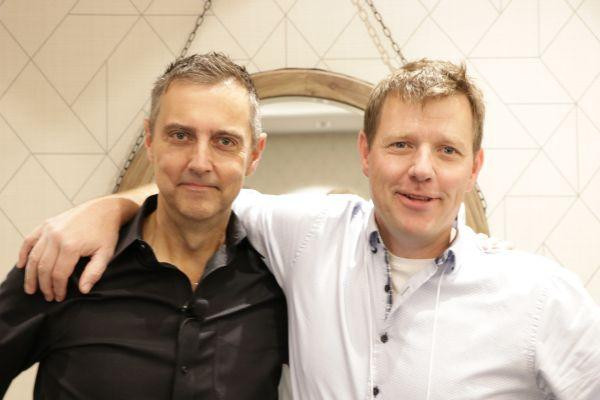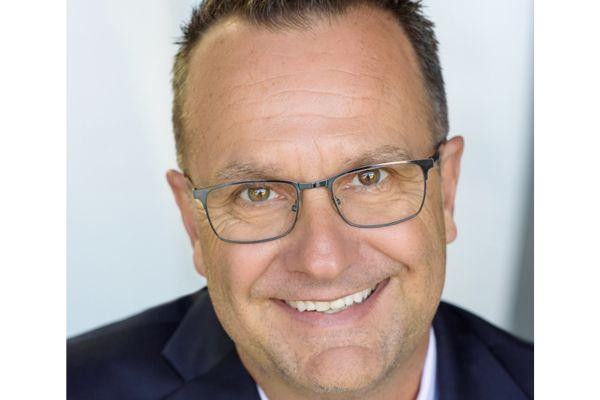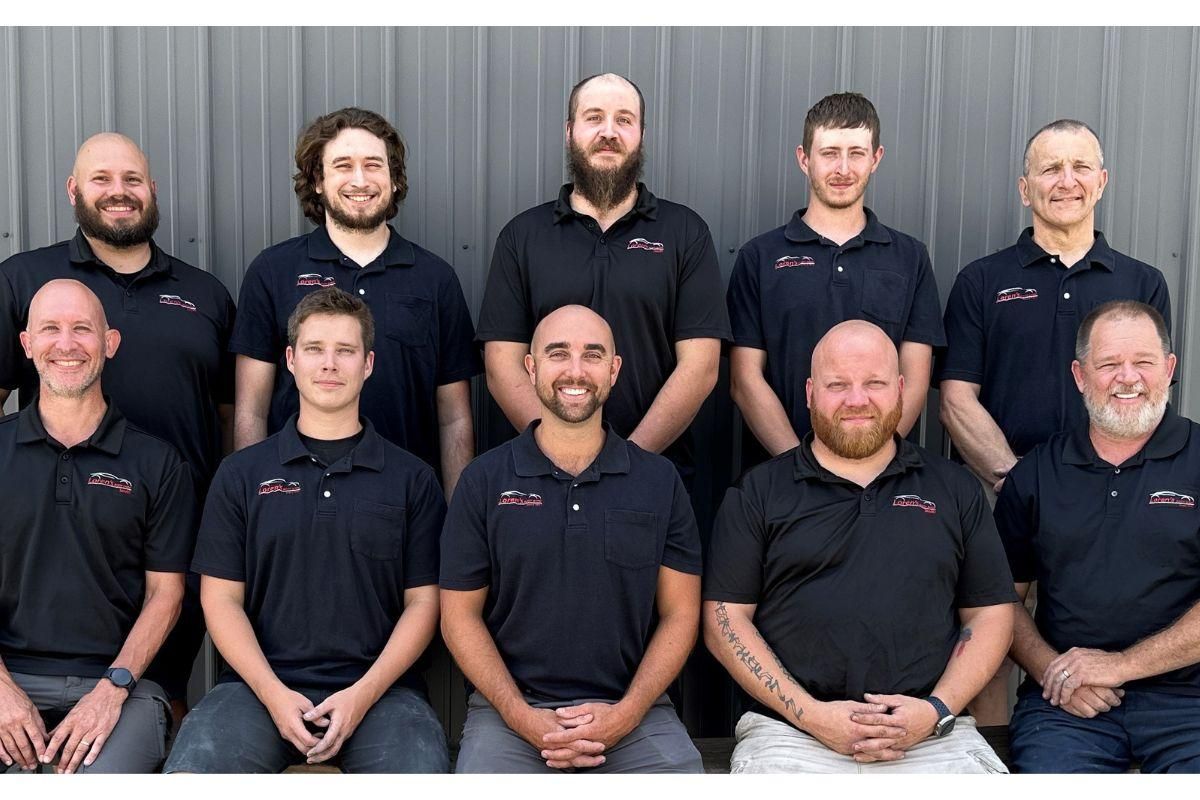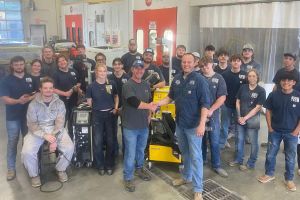Six years ago, during the COVID-19 pandemic, a member of the Elite Body Shop community spoke out against the negativity plaguing the world and the collision industry.
“This fellow reminded us that we have a choice within us to be the light or we can be swallowed into the darkness and negativity out there,” said Dave Luehr, founder of Elite Body Shop Solutions, a company dedicated to the success of independent collision repairers worldwide.
 Dave Luehr, left, and Ryan Taylor, right.
Dave Luehr, left, and Ryan Taylor, right.
Fast forward to 2025 and Luehr said there are still many challenges. However, he recognized the opportunity to shine a light on the collision repair industry, and teamed up with Ryan Taylor, founder of BodyShop Booster, to host the sixth annual virtual Positivity Summit, held earlier this year.
During a full day of presentations, more than 50 shop owners, experts and thought leaders from around the world shared suggested actions to help business owners grow.
“We have lots of challenges in our industry, but we also have lots of opportunities,” said Taylor.
This is part one of a four-part series summarizing the presentations that took place.
Building Trust When It Matters Most
The Positivity Summit kicked off with Lt. Col. Scott Mann (retired), a former U.S. Army Green Beret with combat tours worldwide. Mann is the founder of Rooftop Leadership, where he shares the rapport building and storytelling skills that he learned in special forces to help today’s leaders make better human connections in high-stakes, low-trust engagements.
As a young Green Beret officer in 2005, Mann recalled being in a tiny village in Afghanistan, thinking they would get attacked. The senior special operations non-commissioned officer (NCO) responded by reminding him that nobody was coming, they had a good team and would be fine.
 Scott Mann.
Scott Mann.
That memory always stuck with Mann over the years.
During the Positivity Summit, Mann shared the Afghanistan village has experienced 40 years of war and encountered a lot of “churn.” He said that’s not unique to Green Berets.
“It’s this same set of social conditions here at home where people are so distracted, disengaged and distrustful that it’s difficult to move them into action,” explained Mann. “What Green Berets do is work by, with and through with people to help them stand up on their own.”
He described Green Berets as relationship-based connectors, who happen to be lethal when absolutely necessary.
When they experienced night-time attacks in the village, Mann said the team would run up on the rooftops and fight while everybody else hid below. When the sun came up, they returned to the farms, met with the elders and drank tea. The next night, they returned to the rooftops.
“It’s usually one farmer who has made a decision to go up on his roof and defend his home,” said Mann. “Over the next few weeks, muzzle flash after muzzle flash will show up on those rooftops until eventually everyone is collectively putting fire into the attack.”
That’s what Mann called “rooftop leadership,” the ability to move people up onto a proverbial rooftop when they're afraid, scared and angry to come through that churn. It involves modeling what “right” looks like as a leader when it's scary and nobody is following you.
“There was a time for most of us, as parents, coaches and business owners, we could just trust our instincts to move us through,” noted Mann, who said that is no longer the case. “That churn that we dealt with multiple times in places like Afghanistan is here in the modern world in civilized society.”
He pointed out how distracted, disengaged and disconnected people are.
According to Gallup, 85% or more of employees and managers are disengaged. “That means they lack purpose and meaning,” Mann said.
He also mentioned how disconnected people are, with two-thirds of Americans reportedly not trusting their neighbors.
“If you take that at a baseline level and apply that to the industry that you are in where people are already in a heightened emotional state, you're going to have a challenge with churn,” he said.
Mann recommended leaders recognize the churn is real, train to navigate through it and take steps to connect with others.
“Human connection is at the heart of everything,” he said. “That's actually what gets you through a crisis.”
He also shared the benefits of building trust when risk is low, similar to how the Green Berets would come off the roofs and drink tea with the locals to build rapport. The relationship they built is what Mann said caused people to eventually go up on those rooftops.
“The relationship is the asset. What works in life and death circumstances works in life and business,” said Mann. “We're all wired the same way. It doesn't matter what our culture is.”
Mann’s book, “Nobody is Coming to Save You: A Green Beret’s Guide to Getting Big Sh*t Done,” is about understanding that meaning, emotion, social connection, storytelling and struggle are the five lenses and levers needed as leaders, parents, coaches and business owners to navigate churn. “If you put those into play, you're going to have a competitive edge,” he said.
Small Town Success
Greg Lobsiger, owner of Loren's Body Shop in Bluffton, IN, shared insight during the Positivity Summit about being successful in a small town. Lobsiger’s grandfather opened the collision repair facility in 1951 with his two sons, and Lobsiger became the owner of the family business in 2000.
 Greg Lobsiger.
Greg Lobsiger.
Although Loren’s Body Shop is located in a small town of about 10,000 people, Lobsiger projects the I-CAR Gold Class shop will bring in $5 million this year.
“That doesn't happen overnight, as we all know,” he said. “We've been here a long time and have really grown here in the last 15 years.”
The business owner attributes the shop’s growth to the focus on providing the highest level of customer service, a stress-free repair and a commitment to safety.
“Google reviews are definitely a factor,” noted Lobsiger, who proudly shared that Loren’s Body Shop has 775 five-star reviews.
“That customer has to leave as a raving fan,” he said. “Even though people aren't super excited to go to a body shop, at least that experience was good.”
He reminded business owners that customers will likely share their experiences -- both bad and good -- with friends and family members.
By focusing on a good customer experience, Lobsiger often hears clients tell him what started as very negative being in an accident turned out to be an awesome experience due to how they were treated.
Lobsiger credits the great service to his hard-working employees. He has made it a priority to hire some “rock stars” over the years who are very engaged with customers.
“You have to have high-quality people who are dealing with not only the customers but also are able to negotiate and be smart in the way they deal with insurance carriers,” he explained.
Although he said they have a lean crew, they have a ton of fun and employees earn a substantial amount of money.
“The focus for me is long-term mutual prosperity for everyone,” he said. “That's crucial.”
He discussed a philosophy of the late billionaire Charlie Munger, a longtime business partner of Warren Buffet. Munger was a weather forecaster in the military and analyzed weather patterns for fighter pilots. Rather than determining what the safest routes were for the weather conditions, he inverted the question and asked, “What can I do to kill these pilots?” Lobsiger said it allowed Munger to see the potential dangers and make sure they were never put in a situation where their plane would ice up or run out of gas.
Lobsiger said it’s no different during a repair when there is a damaged or missed part.
“Let's look at it backward,” he said. “How can we prevent that from ever happening?”
He recommended technicians go back to the basics and start with the blueprint and mirror-match process.
He acknowledged there are days when employees can get frustrated, but they take pride in working as a team.
Lobsiger implemented a “problems board” where employees write down the bottlenecks in the shop. The entire group reviews the board every two days and discusses how to address them. Luehr noted the positive approach of using the problem board as an opportunity for employees to improve.
For those fearful of advancing technology and facing the challenges of getting ADAS services performed in a small town, Lobsiger recommended shop owners and managers get out of their bubbles and surround themselves with like-minded individuals. He encouraged involvement through associations and 20 Groups to learn and stay up to date with the changes taking place in the industry to be successful.













